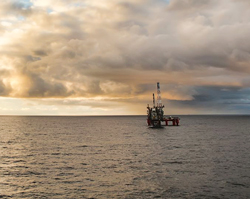World Oil: You have referred to a paradox in the findings of Oil & Gas UK’s latest offshore activity survey. Could you explain that? Malcolm Webb: The paradox in the Offshore Activity Survey 2014 is that, on the one hand, we marked up an all-time record for capital investment in the basin during 2013 at more than £14 billion, while, on the other hand, we still have a serious productivity challenge and, perhaps even more worryingly, a continued slump in exploration activity. This was both in terms of the number of wells drilled and in the number of barrels of oil discovered. It was a very disappointing year on the back of the two previous years, which had also been disappointing, so we’re beginning to talk about there being an exploration crisis now. WO: What has caused this exploration crisis? Webb: When we asked our members why they didn’t drill all of the wells that they had planned to drill, on the UK Continental Shelf [UKCS], there were two reasons that stood out. The first was access to rigs. This basin doesn’t seem to be able to attract enough rigs to deal with its requirements. The second was access to capital. You can’t borrow to do exploration, you have to do it from equity capital, and it would seem that there is a problem in attracting that capital. This tells you something about the attractiveness of the basin now—that, perhaps, people think the rewards likely to come from investments aren’t worth the effort. Costs are going up, and while cost inflation in our industry is a global phenomenon, it is more troublesome here, because it meets declining production. This means that on a unit of production basis, we are becoming ever more unattractive. We hope that this can be turned round. WO: What is causing this rig shortage? Webb: The rigs are going to places where it is better to drill. One drilling company pointed out to me recently that, if you are really lucky, you might get a 2–3 year contract in the UKCS, but if you go to West Africa or the Far East, you can look at 7–8 years. If you’ve got a massive piece of capital equipment, in which you have just invested £500 million or more, you will look for that long-term contract, if you possibly can. WO: Is it all bad news for the North Sea? Webb: There was some good news. Last year, the production decline in the North Sea was roughly half of what it was the year before, and we’re hoping that this year we might see it bottom out, with the possibility that we might see some increase in production levels in the future. However, we’ve still got to improve productivity. To look at it from another angle, we’re aware that production efficiency has declined significantly over the last 10 years, from an average of around 80% to around 60%–70% now. That’s a very significant drift, and we need to turn that around as well. WO: You have called Sir Ian Wood’s review of the UK’s offshore oil and gas industry a “watershed” opportunity. Why is that? Webb: The Wood Review calls for three main things. The most important, as I see it, is the need for a well-resourced, switched-on regulator—a professional regulator that can offer the right terms and conditions to attract and retain people of sufficient quality. The truth is that the oil and gas division of DECC (the UK’s Department of Energy & Climate Change, the sector regulator) is grossly under-resourced and highly stretched. It is doing the urgent things, but it hasn’t got the time, resources, or, dare I say it, the full competence to do all of the important things that a regulator should be doing. The second point Sir Ian makes is that the regulator should act as a catalyst for a new approach to the UKCS—a tri-partite approach to maximizing oil and gas recovery, involving the new regulator, the Treasury and the industry. The third part of Wood’s prescription is that there should be more collaboration across the industry. This is a challenge, because the industry is a highly competitive one. WO: Wood noted that the more hands-on approach taken by Norwegian and Dutch regulators seemed to pay dividends. Should the UK be emulating those models? Webb: The Norwegian regulator, Norwegian Petroleum Directorate (NPD), is much better resourced. Wood pointed out that, while there are about 45 people in DECC looking at oil and gas, both onshore and offshore, there are over 200 in the equivalent unit in Norway. A more active regulator can bash heads together when need be, and require people to take a more collaborative approach. WO: Bente Nyland, NPD’s Director General told World Oil that it is vital to take measures to enhance oil recovery and boost exploration before existing infrastructure is removed. Would you agree with that? Webb: Absolutely. Without that infrastructure, the types of fields you are likely to find may well be too small to justify the creation of large transport infrastructure from scratch, so the risk is that it will stay in the ground. WO: The Wood Review called for fiscal stability; is that regarded as essential by the offshore industry? Webb: We are going to need more than stability; we are going to need improvements in the fiscal regime and more predictability. The government needs to adjust the fiscal regime, to fit the circumstances of the North Sea, and stop treating the basin as if it were still in its early flush of youth. We don’t want any unpleasant surprises on a regular basis, which is what the basin was faced with right through the decade to 2011. It’s no coincidence that exploration activity slumped by 50% in 2011. That was the year when the top rate of tax on production was taken up to 81%. It wasn’t necessarily the only reason, but it was a large contributory factor. WO: Does the offshore industry in the UK back all the findings of the Wood Review? Webb: We subscribe to its recommendations entirely as, by the way, do the UK government and the Scottish government. So there is unanimity of purpose there. It’s good to hear government ministers saying they are going to implement the Wood Review’s recommendation without delay. WO: But won’t all this require more government money, to provide incentives and fund new initiatives, at a time when state finances remain tight? Webb: Not necessarily. By introducing the Field Allowance (a tax break), the government is effectively accepting that headline rates of tax are a disincentive to investment, by making developments that would otherwise go ahead uncommercial. So, we are already moving down that path. What is needed now is some simplification of the process and some bolder headlines about the future. Ultimately, that will mean tackling high headline rates of tax. WO: Do you think technological developments are key to maximizing oil and gas recovery, in the UK North Sea, as the Wood Review suggests? Webb: There is a view that the UKCS is not as fast in technology take-up as, for example, Norway. That needs closer examination, but I think we could say there is more scope for technology take-up in the UK. Recovery rates are one area to look at. Most oil fields in the UKCS still have more oil left in them than has been produced, when they are decommissioned—they have recovery factors of well under 50%. If we can enhance oil recovery from known reservoirs, that could have a significant impact on production volumes. The technology is available, but we need to work out ways we can deploy it, at scale, in the offshore. Another area where we may not be deploying existing technology well enough is in the use of very advanced sub-surface imaging for exploration. We are using it where fields are being developed, but are we using it enough for exploration? Again this is down to the availability of capital because this technology isn’t cheap, but it will help to unlock the potential of the basin. WO: Can measures such as the Scottish government’s recently announced £10.6 million ($17.6 million) funding for an Oil and Gas Innovation Centre (OGIC) make a difference? Webb: This is a welcome step in the right direction. Oil & Gas UK recently ran a technology showcase, where 70 small technology companies came in to talk to us about what they might be able to do for the industry, while some of the major operators talked about their technology needs. We need to improve awareness and stimulate activity. The history of North Sea development is actually encouraging. There are also a great number of supply chain companies throughout the UK. We certainly broke new ground in subsea technology, and if you go to Westhill, in Aberdeen, we still have the global hub for subsea engineering, where a lot of companies are clustered together. We’ve shown that we can take innovative technologies and apply them. Now, this mature basin calls for an awful lot more of that. It’s the perfect hotbed for the application of new technologies. WO: Does the same apply for decommissioning? Webb: Yes, that’s another area where the UK could take a commanding lead. We’re first movers with this, given the maturity of the basin. We have estimated that there is some £40 bn ($66.3 bn) of accrued decommissioning liabilities out there in the North Sea. That’s a huge sum. I think the challenge for the industry—and indeed the government, which is going to be paying a large proportion of the costs—is to find better, and less costly, ways of going about it. WO: Is this an area where pooling resources would work well? Webb: It’s a classic area for collaboration. Individual field operators reinventing the wheel on decommissioning every time doesn’t seem like a very bright thing to do, so, perhaps, we should be looking at how we could work together and make sure it happens in an ordered basis. WO: Finally, have the uncertainties created by the approach of the September 2014 referendum on Scottish independence proved disruptive for the industry? Webb: I haven’t seen evidence of anyone putting off investment plans because of fears about the outcome of the referendum. If there were major concerns, we probably wouldn’t have had record capital investment last year. I’m not altogether surprised by this, as ours is an international industry, which is used to upheavals and political change. We are, of course, paying close attention to any developments; however, this is not a matter for the oil and gas industry, but for the Scottish people to decide. Whatever the result, there needs to be constructive, collaborative behavior afterwards. It’s in everyone’s interest to keep the industry operating smoothly whatever the outcome—and remember 55% of the jobs linked to North Sea oil and gas are not in Scotland, they lie across the whole UK. So everyone has an interest in not damaging this industry.
|
- Advancing offshore decarbonization through electrification of FPSOs (March 2024)
- Subsea technology- Corrosion monitoring: From failure to success (February 2024)
- Driving MPD adoption with performance-enhancing technologies (January 2024)
- Digital transformation: A breakthrough year for digitalization in the offshore sector (January 2024)
- Offshore technology: Platform design: Is the next generation of offshore platforms changing offshore energy? (December 2023)
- 2024: A policy crossroads for American offshore energy (December 2023)
- Applying ultra-deep LWD resistivity technology successfully in a SAGD operation (May 2019)
- Adoption of wireless intelligent completions advances (May 2019)
- Majors double down as takeaway crunch eases (April 2019)
- What’s new in well logging and formation evaluation (April 2019)
- Qualification of a 20,000-psi subsea BOP: A collaborative approach (February 2019)
- ConocoPhillips’ Greg Leveille sees rapid trajectory of technical advancement continuing (February 2019)




